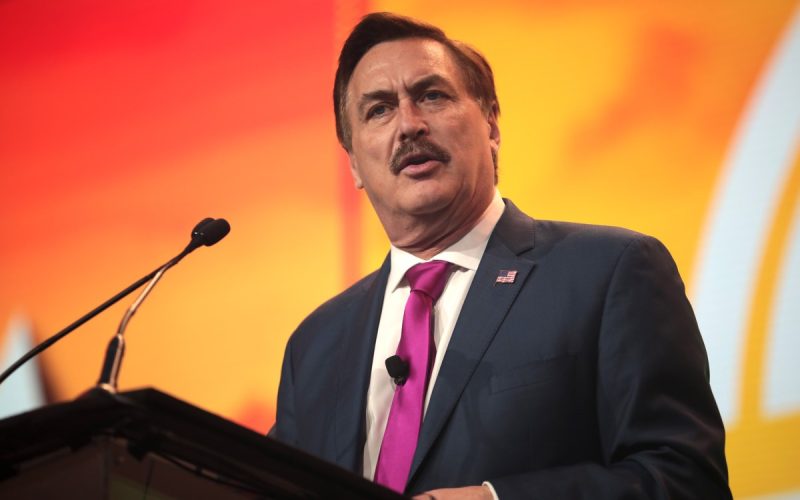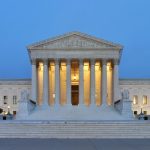The courtroom drama surrounding MyPillow CEO Mike Lindell has reached fever pitch as the controversial entrepreneur takes center stage in what could become one of the most consequential defamation trials of the decade. Jury selection began Monday for Lindell, who is charged with defamation for claiming that Dominion Voting Systems and one of its employees rigged the 2020 presidential election, setting the stage for a legal battle that could reshape how election conspiracy theories are prosecuted in America.
Can a Pillow Mogul Survive the Truth About His Election Claims?
The Denver federal courthouse has become ground zero for what the staunch MAGA supporter has coined “the trial of the century”. Mike Lindell, the 62-year-old Minnesota businessman who transformed a small pillow company into a multi-million dollar empire, now faces his most daunting challenge yet. The case stems from his relentless promotion of baseless claims that Eric Coomer, a former Dominion Voting Systems executive, orchestrated a massive election fraud scheme.
Born Michael James Lindell in 1961, the MyPillow founder’s journey from addiction recovery to pillow empire builder seemed like an American success story until his venture into election conspiracy theories. His company, founded in 2004, grew from humble beginnings in a Minneapolis garage to generating hundreds of millions in revenue through aggressive television marketing campaigns. However, his post-2020 election activities have overshadowed his business achievements and landed him in multiple legal battles.
What Really Happened in That Alleged Antifa Conference Call?
The crux of the case revolves around explosive allegations that during a call, a man identified as “Eric from Dominion” had ensured that President Trump would not win and that he “made effing sure of it”. These claims, originally promoted by Colorado podcaster Joe Oltmann, were amplified by Mike Lindell across his media platforms and public appearances.
Coomer alleges Lindell targeted him as part of his disinformation campaign, including by claiming “Eric, the Dominion guy” conspired to rig the election against Trump on an “Antifa conference call”. The former Dominion executive, who served as Director of Product Strategy and Security, has maintained his innocence and describes the ordeal as a nightmare that destroyed his career and personal life.
Eric Coomer’s background reveals a career dedicated to election security technology. With a PhD in Nuclear Engineering from the University of California Berkeley, Coomer spent years working to improve voting system security before becoming the target of conspiracy theorists. His lawsuit, filed in 2022, seeks to restore his reputation and hold accountable those he claims systematically destroyed his life through false allegations.
Is Mike Lindell Walking Into a Legal Trap by Testifying?
Lindell is expected to testify in his own defense, a decision that legal experts describe as extremely risky given his history of explosive outbursts. Previous depositions have shown Mike Lindell’s volatile temperament, with attorneys describing him as “vulgar, threatening, loud (and) disrespectful” during depositions, where he yelled, swore, and called lawyers names.
The trial proceedings have already revealed damaging evidence about Lindell’s conduct. Coomer’s attorney filed a motion for a protective order for certain exhibits such as Coomer’s employee file, his resignation, materials from his therapist, and a settlement agreement with Newsmax, suggesting the scope of damages extends far beyond simple reputation harm.
Could This Trial Bankrupt the MyPillow Empire?
The financial stakes couldn’t be higher for Mike Lindell and his business empire. Both Dominion and another voting tech company, Smartmatic, are actively suing Lindell for defamation, with Smartmatic alleging that Lindell “generated profits for his company by skillfully incorporating product promotions to his defamation campaign”. This suggests that Lindell’s election conspiracy promotion was intertwined with his business marketing strategy.
The trial is expected to last through the end of the week, with Coomer testifying that he sued to get his life back, though he doesn’t expect attacks on his character to stop once the trial is over. When asked if he wants Lindell to stop his attacks, Coomer answered, “I would like nothing more than for him to stop”.
Will Justice Finally Catch Up to Election Conspiracy Profiteers?
The broader implications of this case extend far beyond Mike Lindell’s personal legal troubles. The case involves allegations of “false allegations of criminal conduct on a scale unprecedented in American history”, according to court documents. This trial could set important precedents for how courts handle defamation cases related to election conspiracy theories.
Legal observers note that this case represents a critical test of whether individuals who profit from spreading election misinformation can be held accountable through the civil court system. The outcome could influence similar cases against other prominent figures in the election denial movement.
For Colorado’s election integrity advocates, this trial represents a crucial moment in the fight against disinformation that has plagued the state since 2020. The Denver venue is particularly significant, as Colorado has been at the forefront of election security innovations and has faced numerous conspiracy theory attacks.
Interested in Political News Read here
As the trial continues, all eyes remain on whether Mike Lindell’s decision to testify will vindicate his claims or provide prosecutors with the ammunition they need to secure a decisive victory for Eric Coomer. The stakes couldn’t be higher for both men, with reputations, fortunes, and the future of election discourse hanging in the balance.
Interested in US News Read here
The trial continues at Denver’s Alfred A. Araj United States Courthouse, with closing arguments expected by the end of the week. Whatever the outcome, this case will likely be remembered as a watershed moment in America’s ongoing battle against election-related disinformation.





